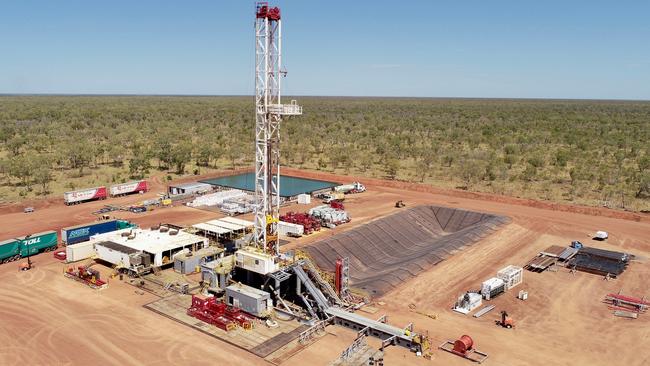
It is not going well. An attempt to reimpose a moratorium on gas extraction in the NT suffered a humiliating defeat with the election of a pro-gas Labor administration and an even more pro-gas opposition.
Not to be deterred, the environmental carpetbaggers have begun fracking for grievances in the Indigenous community that could be used as ammunition in their campaign against Origin Energy and other companies with stakes in the hydrocarbon-rich Beetaloo Basin 600km south of Darwin.
“For years Traditional Owners have been fighting Origin,” GetUp wrote to its supporters recently. “We’re asking you to make a weekly contribution to establish a Solidarity Fund to support Traditional Owners in their fight against fracking.”
A more despicable example of soliciting money under false pretences is hard to imagine. The lies we have come to expect. The appropriation of the Indigenous cause to line GetUp’s own pockets, however, was a new low for the organisation, surpassing the sexist campaign of slander and intimidation against Liberal MP Nicolle Flint at the 2019 federal election. In fact, the traditional owners of this sparsely populated land have given their blessing to this and other projects. Under agreements painstakingly brokered by the Northern Land Council, they will receive a percentage of revenue.
The threat to the environment is, to all intents and purposes, non-existent. Energy companies have to jump through hoops to receive environmental approval under the strict rules imposed by the NT government. Sacred sites have been identified and ruled out of bounds.
GetUp’s campaign would rob the traditional owners of their royalty cheques and chances of employment while pretending to be their saviour.
While the green movement has been obsessing about coal, throwing everything it could muster into the battle against it, the search for hydrocarbons has moved elsewhere, to the rich reserves of gas and oil trapped within tight shale formations deep in the earth.
Three innovations in the last quarter-century made the extraction of shale gas possible and profitable. The first was the use of slick water, water mixed with sand and small quantities of household chemicals to open microscopic cracks releasing hydrocarbons. The ability to drill around corners for several kilometres and the technology to transport liquid gas economically by sea turned shale gas into a lucrative commodity.
Since our nation abounds in most of nature’s gifts, it should come as no surprise it abounds in hydrocarbon-rich shale.
The Beetaloo shale was deposited one and a half billion years ago and lies in largely unbroken strata up to 2km below the surface.
Geoscience Australia calculates the quantity of gas at 250 trillion cubic feet, more than 30 times the gas extracted from Bass Strait and 15 times the capacity of the Browse Basin offshore and north of Broome.
Shale gas has rewritten the business model of the energy sector, and could change the business model of the NT. Darwin could be transformed from a government-funded service centre for Indigenous misery to the new Dallas, or at the very least something resembling Perth, a city where lawyers, accountants, engineers and truck drivers live comfortably on the back of mining.
The shale revolution in the US has been unstoppable. Cheap gas is rapidly replacing coal in generating electricity. Chemical manufacturing and other energy-intense industries have returned on shore, revitalising the pre-COVID-19 job market. With gas comes oil. In the past 10 years, US oil production has risen from seven million to 17 million barrels a day, 50 per cent more than Saudi Arabia.
Beetaloo, by rights, should be the green movement’s Waterloo, the moment when the progress it has been trying to halt tramples it underfoot.
The science behind fracturing is well established. A three-year study by CSIRO published early this year found fracking had no impact on air or water quality. Standard water treatment techniques reduced levels of geogenic chemicals — contaminants from geological formations — within acceptable limits and water recovered to its pre-fractured state within 40 days.
The NT government ended its moratorium on hydraulic fracturing in 2018 after a scientific study found drilling for shale gas was safe and lucrative, injecting up to $17bn in the NT economy and creating more than 500 jobs.
The benefits of a thriving gas industry for the local Indigenous population are indisputable. Mining employs a higher proportion of Indigenous workers than any other industry. The revenue that would accrue to the traditional owners is considerable. The challenge is to distribute it fairly and with regard to the negative effects of sit-down money.
Yet the complexities of land ownership remain one of the biggest barriers to extracting the wealth buried hundreds of metres underground. In the US the formula was simple, since minerals belong to the landowner.
In Australia, where royalties accrue to state governments, securing consent of landowners for a rig to be placed on their property is somewhat harder. In the early days of coal-seam gas extraction in Queensland, the conflict led to the formation of Lock-the-Gate, an unholy alliance of deep green activists and discontented farmers.
The solution is to grant landowners a share of royalties, the formula effectively applied in the NT.
Yet the process of identifying the rightful owners is far from simple. In the Beetaloo Basin it falls to the Northern Land Council to figure it out.
Armies of anthropologists and cultural experts work for months, even years, on the task, at the mining company’s expense.
The process naturally leads to resentment among those who miss out, generating the grievance hardcore environmentalists from interstate are keen to exploit.
So, not for the first time, Indigenous Australians are collateral in a bigger game, starved of the benefits of modernity on the pretext of saving them.
Nick Cater is executive director of the Menzies Research Centre




After failing to stop the Adani mine, the protest industry has been prospecting for fresh seams of outrage to energise donors and loosen credit cards.